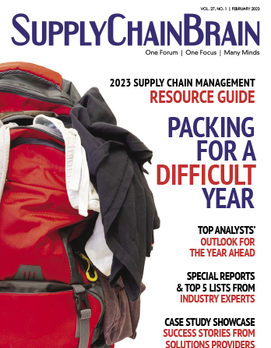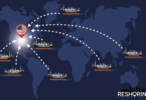
Home » After Its Sale, StarKist Needed a Partner to Provide Logistics
After Its Sale, StarKist Needed a Partner to Provide Logistics

August 2, 2011
When a subsidiary company is spun off by its parent, there should be certainty about how the logistics services it needs to survive will be provided. Does the company being sold provide them itself or is the new parent expected to cover that important area? Perhaps a third-party service provider is to step in at that point?
These were among the questions that confronted executives at StarKist, the distributor of numerous tuna products, when parent Del Monte sold the property in 2008 to Dongwon Industries, a Korean conglomerate with extensive business in commercial fishing. Dongwon was not prepared to provide the end-to-end logistics services needed to receive, warehouse and distribute product to customers in the U.S. Nor was StarKist itself adequately staffed to handle its logistics needs. As someone might have told StarKist's hat-wearing, cartoon mascot: "Sorry, Charlie."
An interim solution was struck that called for Del Monte to continue to handle this all-important area, says Jerry Seidell, StarKist's vice president of logistics and planning. An operating agreement governed the parties' rights and responsibilities. However, a firm date mandated that Del Monte, which had taken over StarKist in 2002, would terminate its relationship on Sept. 27, 2010.
Seidell and his team had their work cut out for them. "We were in the midst of creating our own operating system with SAP," he says. "We needed to create a network as well, and we had limited staffing and resources. We just weren't staffed to do all those things. We had a nine-month window to begin implementation from the time we no longer had backroom support to the time we had to stand alone. In essence, we had to create not only an operating environment but a network to service our customers."
Given it limitations, the staff knew precisely what it had to do: retain a 3PL. A rigorous RFQ/RFP vetting process winnowed the field of candidates to three before it finally settled on DSC Logistics.
"It provides a complete logistics support package from the time we receive product at the port - storing the product, moving product to warehouses throughout the U.S. and delivering the product to customers in all sizes and shipments, whether it be in LTL, a consolidated shipment or in truckloads. It's complete logistics-3PL service from the time of receipt states-side because all of our product is shipped in country from abroad. Plus they do inventory management," says Seidell.
DSC was tasked with providing a full menu of services from the get-go, says Seidell, but the value in the partnership extends to some intangibles that perhaps weren't foreseen. For instance, there were times that the StarKist team wasn't entirely comfortable with the data management in its SAP system. "We were not necessarily trusting some of the data," he says.
However, DSC was an information repository the StarKist team could call on and audit against. "We could really bounce our inventory accuracy against what was being recorded in SAP. So, they've [DSC] been able to refine our processes."
Another area where DSC lent a hand was in StarKist's deployment practices during its start-up phase. "DSC developed an off-line tool to use as a cross-reference to double-check on our methodology to make sure we were deploying product on time and in the right quantities across our network. This was something that we didn't have at the time of cut-over," Seidell says, referring to the transition from Del Monte to DSC.
"We just didn't have good, clear visibility to that before, but now we have data elements in front of us to understand how to move product."
Going forward, the key is not in new services but optimization. "How can we look at the entire network and make things more efficient? How can we take it a step further, do it more efficiently and still service customers at a world-class level?"
What a difference a relationship makes. At the time of the divestiture, StarKist simply didn't have the infrastructure or the headcount to provide for itself. Now its leaders can speak of tweaking things down the road, says Ken Heller, vice president of supply chain excellence at DSC Logistics.
The progression has been successful for the parties, but it was one that proceeded on a very tight timeline. Del Monte was literally in charge the day before the cut-over. Downtime of about five days followed, Heller says, then StarKist was up and running, without any disruptions to its customers.
Specifically, here's how the relationship works. Product sourced abroad, including from Ecuador, Thailand and Samoa, arrives at the Port of Long Beach. DSC receives it and moves it to a centralized distribution center at Mira Loma, California. Some customers are serviced from that facility; others from DSC centers in Illinois, Texas, Georgia and Pennsylvania.
DSC offers full turnkey transportation administration from negotiating with carriers, to providing routing guides, order management, track and trace, invoicing and other services. In addition, it provides inventory management, which involves calls twice a week with StarKist executives to discuss levels. In addition, a DSC employee is resident at StarKist headquarters in Pittsburgh.
That the relationship has been a success is attested to by the fact that it survived a test very early on, Heller says. "Shortly after we began operating, we came up on their busy season, January through March, and we did a great job of getting them through a very important portion of their year, the busiest time of their year."
The transition was seamless, with customers feeling no pain, Heller says. "That's what they initially hired us to do, and now we're making improvements."
Resource Links:
DSC Logistics
StarKist
RELATED CONTENT
RELATED VIDEOS
KEYWORDS All Warehouse Services consumer packaged goods Food and Beverage Inventory Planning/ Optimization Logistics Logistics Outsourcing LTL/Truckload Services Technology Transportation & Distribution Transportation Management Warehouse Management Systems
Related Directories
Subscribe to our Daily Newsletter!
Timely, incisive articles delivered directly to your inbox.
Popular Stories

2023 Supply Chain Management Resource Guide: Packing for a Difficult Year
VIEW THE LATEST ISSUECase Studies
-
JLL Finds Perfect Warehouse Location, Leading to $15M Grant for Startup
-
Robots Speed Fulfillment to Help Apparel Company Scale for Growth
-
New Revenue for Cloud-Based TMS that Embeds Orderful’s Modern EDI Platform
-
Convenience Store Client Maximizes Profit and Improves Customer Service
-
A Digitally Native Footwear Brand Finds Rapid Fulfillment



